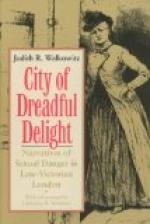Aquila rode closer to her, his horse panting under the effort. His face looked strange and distressed.
“Lady,” he said in low tones, “necessity forces me to speak to you in your grief; do not blame me for indifference to your desire to be alone. But we must care for you, though in your heart this moment you may resent a wish to live. But your father commanded me!”
She gave him attention.
“Let us not carry peril with us,” he added in a half-whisper. “Let us not carry food for pestilence with us.”
“I do not understand,” she answered, adopting his low tone.
“The more we are, the more of us to die. You must live; I must live,” he explained, nodding toward Momus.
After a little silence, she asked:
“Do we not ride toward the frosts?”
“Yes; but even now pestilence may ride on beside us—your servant and this woman. Let us save ourselves.”
“Abandon them?” she questioned.
“Lest they go on without us,” he added.
Momus turned suddenly and gazed at Aquila. Then he imperiously signed the pagan to fall back.
They rode on.
The pagan slackened his horse’s gallop and reined in beside the woman. They talked together, argumentatively, for a single tense minute and then Aquila, with a bitter word, put spurs to his animal and dashed up beside Laodice’s camel. In his one uplifted hand a knife gleamed. The other reached toward the casket bound to Momus’ hip. Laodice, raised to an upright attitude in her fresh fright, saw that his face was black and twisted and that he wavered stiffly in his saddle.
But the mute did not await the attack. He seized the pagan’s outstretched hands with that monstrous left and flung him backward. Without an effort to save himself, falling rigidly and with a strange cry, Aquila dropped back over his horse’s crupper into the dust of the road.
“Momus!” Laodice screamed.
Back of her the woman cried out:
“On! On! It is the pestilence!”
Momus wielded his goad. Laodice, shaking and crying aloud, looked back to see the strange woman swerve her camel past the dark shape lying with out-flung arms in the road and sweep quickly on after them.
The scourge had overtaken Aquila.
All night the camels fled east, all night the soft footfall of the woman’s beast pursued them; all night the wind freshened until Laodice’s bared face stiffened with the cold and the breath of the mute that sat upon her camel’s neck steamed in the moonlight. Up and up, by steep and winding wadies they mounted; under overhanging cliffs and past bald towers of hill-rock staring white in the moon, along black passes between brooding eminences of solid night, crowned with ghost-light; over high plateaus darkened with groves, down dales with singing, invisible streams running seaward and up again and on until the hills engulfed them wholly and those before were higher than any they had seen. Then their flying beasts, leaving the Roman road over which they had sped for some distance, followed a sheep-path and burst into an open immersed in moonlight. Below in the distance was a cluster of huts, white and lifeless. But abroad, over the crisp grass and misty white on all the exposed slopes, sparkled the deep hoar frost!




